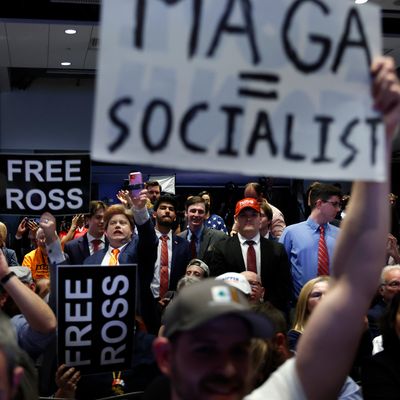
Reflecting the potential significance of minor-party candidates and voters in a close and complicated presidential election, Donald Trump and Robert F. Kennedy Jr. brought a bright media glare to the 2024 convention of the Libertarian Party in Washington, DC. this weekend. Trump and Kennedy, who together are currently supported by a majority of voters according to the RealClearPolitics polling averages, both spoke to delegates from the well-established if perpetually marginal party of strict laissez-faire capitalism and non-interventionism.
Kennedy even hoped to sweep the delegates off their feet and into his camp with a presidential nomination that would vastly simplify his access to state ballots. After receiving a mixed reception for a speech emphasizing his anti-COVID-lockdown credentials and praising libertarian heroes Edward Snowden and Julian Assange (“He shouldn’t be in prison, we should have a monument to him in Washington D.C.”), Kennedy barely made a mark in the party’s presidential balloting, being eliminated as the lowest-scoring candidate in the first round.
But it was Trump who stole the show, and not in a good way. To an audience proud of its principles and ever-fearful of compromise, Trump didn’t much bother to claim common ground. He offered to put a Libertarian in his Cabinet, and rather oddly promised to pardon imprisoned dark web crypto entrepreneur Ross Ulbricht. But otherwise, Trump mostly invited the crowd to try backing a winner for a change:
You should nominate me or at least vote for me. Only do that if you want to win. If you want to lose, don’t do that. Keep getting your three percent every four years.
He did try to strike an anti-government pose by promising to appoint a taskforce to “rapidly review the cases of every political prisoner who has been unjustly persecuted” by the Biden administration. But he made it clear his idea of political prisoners was the “J6 hostages,” who were focused on overturning Trump’s 2020 election defeat rather than the defense of any disinterested principle of liberty.
The delegates responded by booing and heckling the once and perhaps future president of the United States, who is more accustomed to the adulatory atmosphere of his signature rallies.
Trump did not file papers to compete for the Libertarian nomination on grounds that the GOP banned multiple tickets, but claimed against all evidence that he “would have absolutely gotten [the nod] if I wanted it.”
Inviting Trump and Kennedy to speak at the LP convention was a fundraising and attention-getting scheme hatched by the Mises Caucus faction that currently holds all the party’s leadership position. The Mises Caucus has been accused by its intra-party critics of being too friendly to MAGA-style conservatives and of abandoning traditional Libertarian positions favoring abortion rights and combating racism. Perhaps they went too far in turning over the LP podium to Trump, since their candidate for the party’s presidential nomination, Michael Rectenwald, was later upset by the candidate of the opposing Classical Liberal Caucus, Chase Oliver — who is best known for forcing a general election runoff in the 2022 U.S. Senate race in Georgia, which ultimately decided the balance of power in that chamber.
Oliver, who has described himself as “armed and gay,” immediately denounced Trump’s pitch to his party, as CNN reported:
At a news conference following the former president’s remarks, which were heavily and consistently booed by Libertarian audience members, Oliver called it a “mistake” to have Trump speak. “You are not a libertarian, Donald Trump,” he said. “You’re a war criminal and you deserve to be shamed by everyone in this hall.”
Rectenwald’s candidacy may have been hurt by a rambling speech that had a characteristically Libertarian explanation: he’d taken an edible beforehand.
The Mises Caucus did hang onto the party chairmanship, and part of Oliver’s challenge will be keeping the party together. But the LP’s even bigger challenge will be resisting raids on their slim but significant voting base by the two big-time candidates they’ve just heard and spurned. Kennedy is a particular problem, some Libertarians told Politico:
Many Libertarian Party members predicted Kennedy — who is polling historically high for a third-party candidate — would cut into the small share of the protest vote the party typically benefits from in presidential elections. …
Larry Sharpe, a longtime Libertarian Party member who lost his bid for vice president at the convention [said] “RFK sucks the money out of the room and he gets the ‘I’m mad at the system votes’ that we used to get because we’re the only other guy on the ballot.”
Trump will also continue to try to marginalize both Kennedy and Oliver while counting on hostility to the incumbent to minimize the “wasted” votes they receive. Some Libertarians will grudgingly respect Trump for enduring a nasty reception at their convention while Joe Biden took a pass. But if Trump does become the 46th president, he probably won’t forget the losers who dared hoot insults at him as he invited them onto his bandwagon.






























